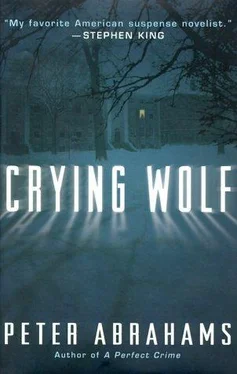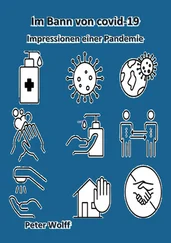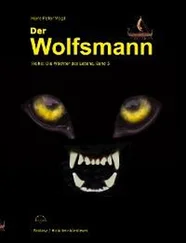Peter Abrahams - Crying Wolf
Здесь есть возможность читать онлайн «Peter Abrahams - Crying Wolf» весь текст электронной книги совершенно бесплатно (целиком полную версию без сокращений). В некоторых случаях можно слушать аудио, скачать через торрент в формате fb2 и присутствует краткое содержание. Жанр: Триллер, на английском языке. Описание произведения, (предисловие) а так же отзывы посетителей доступны на портале библиотеки ЛибКат.
- Название:Crying Wolf
- Автор:
- Жанр:
- Год:неизвестен
- ISBN:нет данных
- Рейтинг книги:3 / 5. Голосов: 1
-
Избранное:Добавить в избранное
- Отзывы:
-
Ваша оценка:
- 60
- 1
- 2
- 3
- 4
- 5
Crying Wolf: краткое содержание, описание и аннотация
Предлагаем к чтению аннотацию, описание, краткое содержание или предисловие (зависит от того, что написал сам автор книги «Crying Wolf»). Если вы не нашли необходимую информацию о книге — напишите в комментариях, мы постараемся отыскать её.
Crying Wolf — читать онлайн бесплатно полную книгу (весь текст) целиком
Ниже представлен текст книги, разбитый по страницам. Система сохранения места последней прочитанной страницы, позволяет с удобством читать онлайн бесплатно книгу «Crying Wolf», без необходимости каждый раз заново искать на чём Вы остановились. Поставьте закладку, и сможете в любой момент перейти на страницу, на которой закончили чтение.
Интервал:
Закладка:
“Like on page one-oh-one,” said the girl from English 103. “ ‘In revenge and in love woman is more barbarous than man.’ And he’s got sexist opinions like that all over the place.”
“Is it possible to mount a defense in this particular case?” asked Professor Uzig. An odd thing had happened: although the professor’s voice remained unchanged, calm, cultured, confident, he’d gone pale. Did he dislike being challenged? Nat had already seen some of the others challenge him, seen how he turned them back with ease. Then what was it?
“You’re asking us to defend that statement?” Grace said.
“For the sake of argument, Grace, as a lawyer would.”
“That’s what’s wrong with-” She broke off at that moment: Izzie had just entered, a few minutes late, and she was wearing Nat’s letter jacket. Grace’s eyes were on her as she sat down; everyone’s were. Nat had two sudden revelations; the first, what a juvenile garment a high-school letter jacket was, certainly his, burgundy with gold sleeves, the big gold C, Nat in burgundy on one sleeve, 8 on the other; the second, he now understood the meaning of a word that had always been doubly foreign to him: chic.
Izzie, aware of everyone watching, said, “Sorry I’m late.” She might have been addressing Professor Uzig, but she was looking at Grace.
“Carry on, Grace,” said the professor.
Grace faced him, opened her mouth, but nothing came out. Nat, sitting beside her, realized she’d forgotten what she’d been saying. “Lawyers,” he said, softly, so only Grace could hear.
“Lawyers,” said Grace, her tone more passionate than it had been before, almost angry. “That’s what’s wrong with lawyers.”
Professor Uzig, his color back to normal, said, “As your punishment for tardiness, Isobel, it’s up to you to defend Nietzsche’s one hundred and thirty-ninth maxim from Beyond Good and Evil. Page one-oh-one.”
Izzie riffed through her copy, read the sentence, looked up. “Women are more barbaric than men?”
“Barbarous,” said Professor Uzig. “The words are not synonyms, barbarous invariably implying moral condemnation, as barbaric does not. Barbarous, then, and in only these two areas, love and revenge.”
“Barbarous love?” said Izzie. “Isn’t that an oxymoron?”
“Is it?” said Professor Uzig.
“And what about domestic violence?” said a girl who’d never spoken before; she had an up-from-under way of holding her head that reminded Nat a little of his mother.
“What indeed?” said the professor.
“Well, it’s indefensible, isn’t it?”
“Anyone else?” said Professor Uzig.
Silence. Nat expected Grace might speak, but she was doodling on her pad, a flower with something dripping from it. Professor Uzig’s gaze found him. He had yet another thought about that jacket: wasn’t it the descendant of knightly finery, what a princess-rescuing fairy-tale character might wear? He never wanted to see the goddamn thing again.
“Nat?” said the professor.
“Yes?”
“Have you done the reading?”
“I have.”
“And your response to this question?”
“A question of my own,” Nat said. To his surprise he said that aloud, the kind of remark that until very recently, maybe until that moment, would have remained inside. Then he asked the question: “Did Nietzsche believe it?”
“Referring to this passage that seems to shock everyone so much?”
“Yes.”
“Go on.”
“That’s it. How do we know he believed it?”
“And if he didn’t believe it?”
“Maybe he was just trying to be provocative.”
“In order to provoke what?”
“I don’t know.”
“Guess.”
“Thought. To provoke thought.”
“What kind of thought?”
“Fresh,” Nat said. “And maybe that’s the connection to Kurt Cobain,” he added, the words popping out on their own, “the provocative part.”
“Oh, dear,” said the professor, “and you were doing so well.”
The bearded student who liked Kurt Cobain leaned forward and said, “Wait a minute. He’s on to something.”
“Something that you can discuss outside class,” said Professor Uzig. “We will begin to separate Nietzsche the provocateur from Nietzsche the philosopher, now that Nat has shown the way.”
“But what about the whole Incesticide CD?” said the bearded student. “The one with ‘Hairspray Queen’ and ‘Mexican Seafood.’ It fits perfectly.”
Grace had been working. She’d repaired the hatch cover, or trap door, in the tunnel, replacing the hinges and adding a pull ring and a rope ladder that unfurled all the way from the frame to the floor below. She’d swept, dusted, cleaned; and that night, by the glow of dozens of candles-in wall sconces, candelabras, and the great chandelier-they saw how magnificent the two rooms really were. They lounged on plush furniture with elaborately carved legs, while the paneled walls gleamed all around, but through pockets of candlelight and shadow, more like an artist’s rendering of Victorian splendor than the real thing, and while Amelita Galli-Curci sang “Caro Nome,” her voice, perhaps because of the recording quality, like some rediscovered instrument from a dead culture.
“We need a name for this place,” Grace said.
“How about the frat?” Nat said.
They both gave him a look.
“The club?” said Izzie, still wearing the letter jacket.
“Yuck,” said Grace.
“The Rigoletto Room?” said Nat.
“That’s the dumbest thing you’ve ever said.”
“Then what?”
“Something underground, like…”
“The burrow?” said Izzie.
“I’ve got it,” Grace said.
“What?”
“The cave.”
“Oh, I like that,” said Izzie. “Didn’t Plato have a cave? This can be Nietzsche’s.”
“I wouldn’t push it that far,” said Grace. “Just ‘the cave’ will do. Nat?”
“The cave,” he said, raising his glass. He gazed through it and saw into the long-ago, or thought he did, and while he was doing that Grace opened another bottle. She poured more cognac in their glasses, heavy crystal glasses she’d found in one of the cupboards, poured cognac from 1899, its color the same as the atmosphere in the room. “Here’s to the cave,” she said, tilting back her head, exposing her perfect throat, draining the glass. Her face reddened at once, and when she spoke her voice was thicker and deeper. “And to Nat’s letter jacket, if that’s what the thing is called.”
Nat sat up straight. Silence, except for Galli-Curci singing her song to the wrong lover, or whatever it was, the details of Rigoletto, never clear in Nat’s mind, now less so.
“It’s sort of funny, isn’t it?” said Izzie, her voice going the other way from Grace’s, thinner and higher; anyone could have told them apart at that moment.
“What is?” said Grace.
“This silly jacket,” Izzie said. “As a fashion statement, I mean. That’s why I borrowed it.”
Enough, Nat thought, and was about to bring everything into the open when he thought he heard a muffled sneeze, not far away. “Shh,” he said. “Did you hear that?”
“What?” they both asked.
They all listened, heard nothing but water dripping, very faint.
Grace turned to him. “You a little wired or something?”
“No.”
“Spooked, down here in the cave?”
“Not at all. I like it.”
“Me too. The best thing about this dump.” She got up from the divan she’d been lying on, filled everyone’s glass again. “A fashion statement,” she said, pausing before Izzie. “What a weird concept.” She continued to pour, candlelight-colored liquid rising to the top of Izzie’s glass and spilling over.
Читать дальшеИнтервал:
Закладка:
Похожие книги на «Crying Wolf»
Представляем Вашему вниманию похожие книги на «Crying Wolf» списком для выбора. Мы отобрали схожую по названию и смыслу литературу в надежде предоставить читателям больше вариантов отыскать новые, интересные, ещё непрочитанные произведения.
Обсуждение, отзывы о книге «Crying Wolf» и просто собственные мнения читателей. Оставьте ваши комментарии, напишите, что Вы думаете о произведении, его смысле или главных героях. Укажите что конкретно понравилось, а что нет, и почему Вы так считаете.












